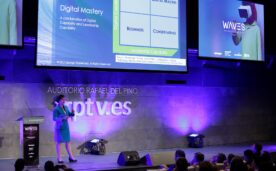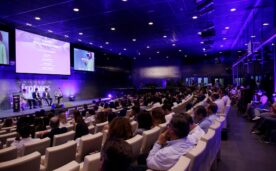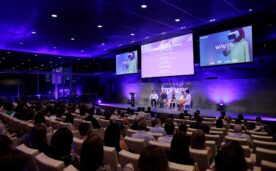WAVES is a key movement in which today's key players come together to visualise all the changes, challenges and opportunities that the New Digital Era has brought. It is an event that has been conceived as a unique experience, bringing together the expertise of governments and corporations, the vision of new generations and the knowledge of one of the most prestigious academic institutions in the world, MIT. All together, they revealed, and discussed how the digital age is transforming the world and is bringing about some of the biggest changes society is undergoing.
WAVES was a turning point in the way we humans perceive our ability to join forces, work together and take advantage of the possibilities brought by this era. The event aimed to bring these players together as they enjoy change and make great things happen. An experience with an optimistic message whereby every organisation and individual can discover the limitless possibilities for transformation, innovation and development that have yet to be explored in the 21st century.
Pablo VidarteCEO of Arkyne Technologies & Bioo
Pablo Vidarte began his intervention by asking whether a plant could be treated as if it were a solar panel. That is the question he raised with his partners. Then, he said, they saw that there were many people doing similar projects and they combined those technologies to develop their own in order to produce electricity through the plants.
Bioo wanted to make the project self-sustainable. At the beginning they needed investment and technology because what they do is to include more electrophilic bacteria that capture the electrical charges that are given off in photosynthesis. In the process they generate water. This technique has many applications.
Bioo's main product is a one metre by one metre panel. It takes 110 panels to power a house and the advantage is that they produce electricity both day and night. The company needs early adopters to fund the company's engine.
The idea behind it all is to make the world more sustainable. A solar panel consumes a lot of lithium, which is expensive and polluting. In contrast, Bioo offers solutions that are gradually becoming more efficient because they believe that there is always a solution that goes further.
Javier AgüeraVice President of Business Development at Snips
Javier Agüera began his speech by recalling that the first industrial revolution began with the appearance of the steam engine. Cities were populated during this revolution. The second industrial revolution was characterised by mass production, specialisation of work and universal education. The third revolution saw the appearance of the computer and the microchip and the arrival of the internet. In the fourth industrial revolution so many technologies will arrive at the same time that they will push us into an uncertain future.
The changes ahead are rapid, simultaneous and systemic. Artificial intelligence will affect all businesses and departments and will do tasks better than humans; it will be able to detect needs and anticipate them. It will work through voice. The problem is that voice is biometric and needs to be protected. In this world, therefore, privacy is of particular importance. In fact, the question today with regard to data storage is not whether or not it will be stolen, but when it will be stolen.
Which actors will be able to respond to the challenges ahead? In this sense, the image of Silicon Valley is not real. It is the military technology that makes it a perfect system for growth, along with the existence of an investor system that makes this possible. But, back to the challenges, Agüera identified the following: explorers grow faster and generate more value than exploiters; it is not about technologies, but about systems; the default future that accompanies technological change is not assumable, the future has to be designed; empower society with knowledge, purpose and values.
Panel: Technology, man's new friend
Javier Agüera, Vice President of Business Development at Snips; Pablo Vidarte, CEO of Arkyne Technologies & Bioo; Juan Garrigosa, Director of Innovation at Endesa, and Juan López Carretero, Head of Digital M&A at BBVA.
Juan López: At BBVA we have seventy million customers, of which twenty million are digital. This is a great opportunity, but with its risks, as we have to respond to issues such as money laundering and the financing of terrorism. Now we have just created a product that allows you to send money via WhatsApp. Technology creates opportunities, but also risks. We try to incorporate things that have value into the culture and the business organisation, taking the best of what works.
Javier Agüera: In cybersecurity we must distinguish between the role of the government and that of private enterprise. Companies that invest more are not doing so in cybersecurity because of the cost involved. In the public sector, action must be taken in relation to the use made of it by terrorism. Furthermore, we must bear in mind that privacy is a fundamental right in which everyone must invest, but we must also change mentalities, for example, with regard to the use of mobile phones in public spaces.
Juan Garrigosa: Technology is changing the world of energy a lot and will increase its presence among us; electric cars and buses, smart buildings that will generate their own energy, cheaper voltaic panels, batteries, big data, ... Other technologies have lowered their prices. So we have to keep transforming ourselves or we will disappear.
Pablo Vidarte: Many companies start as a start up, where everything is new and collaborative. Then they start to grow and that's when they have to start to make the leap. It is an evolution, a chain. But they are more open and flexible than traditional companies. We have worked with all kinds of big companies because collaboration is always good. Public aid is also important.
Lucía SánchezCEO of Unicorn Gamers and the youngest CEO in Spain.
Seventeen-year-old Lucía Sánchez began her presentation by talking about her entrepreneurial career. At the age of ten she started a blog about technology. At eleven she tried her hand at designing games. When she was thirteen, she sold personalised T-shirts on the internet. When he designed his first game, Crazy Block, he only got 100 downloads. Then he sent out press releases everywhere and within a couple of months he had ten thousand downloads. Then he launched his second game and started other projects. Then he started designing websites and developing online shops.
In his opinion, the internet has given rise to more entrepreneurs. Moreover, if you don't know something, the internet offers resources for entrepreneurship and creation. It also makes it possible to offer digital products and there is no need for physical shops. In addition, it allows you to sell worldwide and do online marketing, as well as seek funding on crowdfunding platforms.
As far as human resources are concerned, he considers it very important to set ambitious goals, but without forgetting the need for both socialising and lifelong learning, as well as having the flexibility to combine hobbies with working life.
Regarding the adaptation of large companies to the digital generation, he recommended hiring young people, eliminating hierarchies, modernising offices and developing mixed projects involving teams made up of people from generation Z, millennials and people from generation X.
As for the future of work, he pointed out that robots will eliminate repetitive tasks that generate little added value and will generate more competition, but there will also be more entrepreneurs.
Pablo Santaeufemiaco-founder of Bridge for Billions
In the structure of the business fabric of the richest countries, small and medium-sized enterprises (SMEs) are the most abundant. The others have mainly micro-enterprises. Without SMEs there is no adequate economic fabric, but they have to be created.
To help start businesses we have developed Bridge for Billions, a software to help entrepreneurs get their businesses off the ground.
Entrepreneurship ecosystems are very non-inclusive, especially for women. Our goal is to help entrepreneurship programmes reach many more people. Then we give them the tools for a business and to communicate with those who have resources. We incubate entrepreneurs.
You don't have to have technology, because there is a lot of innovation that doesn't have technology. We also work to incorporate women. We also help entrepreneurs from abroad through mentoring and to encourage intrapreneurship.
Panel: Talent, driving force for change
Lucía Sánchez, CEO of Unicorn Gamers and the youngest CEO in Spain; Pablo Santaeufemia, co-founder of Bridge for Billions; José Luis Saiz, General Manager of Calidad Pascual, and Raul Grijalbo, Executive President of Manpower Group Spain.
Pablo Santaeufemia explained that multidisciplinary and multigenerational teams are more efficient to work with and deal with change. In addition, it is necessary to adapt to digitalisation, but also to adopt new methodologies. He also pointed out that those who undertake entrepreneurship do so because of a lack of opportunities, in the sense that companies' goals are not aligned with those of the workers.
José Luis Saiz pointed out that not much has been achieved individually when it comes to adapting to change, especially because of the speed with which things are changing to the point that an investment can become obsolete in six months. But first and foremost is a change in attitude. He also pointed out that empowering people is everything. To do this, the right environment must be created and people must be given the opportunity, so that people can be trained through projects. Finally, he warned that these things do not happen if management is not involved.
Raúl Grijalbo pointed out that one of the skills of the future is the ability to collaborate. The difference between what we have and what is coming lies in the skills and abilities that will be needed. The key is to mobilise talent, and to do so, it is necessary to have the capacity to learn, to promote self-entrepreneurship and to have leadership that makes people want to give the best of themselves. He also recalled that for millennials the first priority is stability in the job and in the company if they are managed on a project basis. In this sense, companies have had to move from where they were because talent is extremely mobile and will move from one place to another if they are not comfortable.
Lucía Sánchez pointed out the importance of having an internship programme, which is very interesting for learning and incorporating this knowledge into the company. And she added that the brake on entrepreneurship among girls is due to the education they receive.
Vivian GraubardChief Technological Office in the White House with the Obama Administration
We used to think that technology was something that existed in a silo, and yet it is much more, much more even than start-ups. It can be a tool for more empathetic institutions. In this sense, if we think that governance is fundamental to democracy, we wonder what we can do.
Technology does not solve problems, but it is part of the solution because it helps us to make citizens feel that the administration pays attention to them and can respond to their questions and concerns. In this sense, it is important to make sure that everyone gets an answer, and in their mother tongue.
Technology also helps to achieve greater transparency. When this transparency is combined with data, trust and accountability can be built. We need to act by showing that the administration listens to what it is told and improves systems in line with users' needs. This is all about creating public interest in the technology sector.
Panel: New paradigm of transformation
Vivian Graubard, Chief Technological Office in the White House with the Obama Administration; Sophie Blum, Vice President of Marketing for Europe and Emea at Procter & Gambler, and Víctor Matarranz, Chief Strategy Officer at Banco Santander.
Vivian Graubard stressed the importance of taking people into account in order to build solutions with them. It is also important to change the way people work, educating them to change and to take risks.
Víctor Matarranz pointed out that digitalisation changes everything, including customer expectations, and we have to adapt to it by giving customers access to services anytime, anywhere, quickly and digitally. Banking will no longer be physical. The way we work has changed dramatically to a collaborative environment. In the past we focused on results, now we focus on customer satisfaction. In this digitised environment managing talent is a challenge. Your competitors are not banks, they are technology companies, and there are a number of questions. Starting with where a person wants to work and continuing because there is a lot of money to be made in technology. What we do is to have special people in each department who create that environment and with that remuneration.
Sophie Blum said that at P&G they are creating a system to accelerate digitalisation through open innovation and working with start-ups. We are now using all the tools to better understand customer needs and improve the customer experience.
Karl KosterDirector of Corporate Relations at MIT
Our world is characterised by digitalisation and implies that knowledge is everywhere. It is also a denser world of growing population, densification and clustering. And it is a world of exponential technological change.
In this world, millennials are digital natives, empowered by data, they want to feel good and have a purpose, they seek diversity, difference, uniqueness; they write their own history; they are self-sustaining producer-consumers; they are people who are always learning; they want experiences; they share (in the sense of the collaborative economy); they are social validators and for them feeling good is a way of life.
What sets them apart from Generation Z is that they are more multitasking, more entrepreneurial, start earlier, have higher expectations and place a premium on individuality.
As far as the future is concerned, starting with digitisation, with it data moves as in a multi-satellite system, allowing many things, such as the control at all times of the location of a package being transported, monitoring fields, controlling traffic, weather and environmental conditions.
This is important because in the future we will have a 90% urban population and cities will be responsible for 80% of carbon dioxide emissions and 75% of oil consumption.
In terms of technological change, we are entering a new era that will be characterised by 3D printing, bioprinting, artificial intelligence, virtual reality, facial recognition, human augmentation and molecular medicine.
The major challenges will be lack of job opportunities, food, lack of education and poverty.







